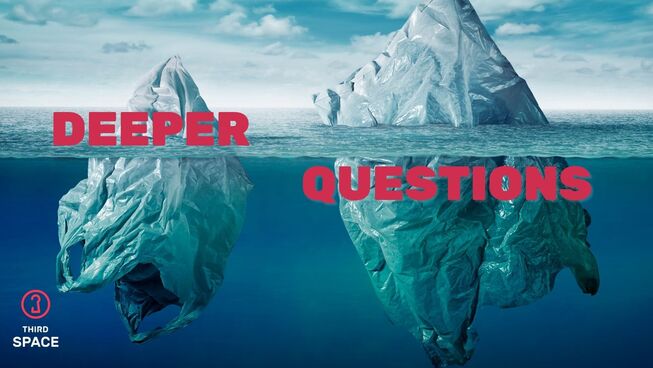Ep 122: Does belief in God add up?
Does maths reveal something bigger? Sandy shares her love of statistics, how statistics makes a difference in the world and how she's navigated some of the really big questions in life. A conversation you can count on to stimulate thought.
Guest: Dr. Sandy Clarke-Errey. Sandy works as a consultant with the Statistical Consulting Centre at the University of Melbourne. She has a PhD in Statistics, is an accredited statistician and also works part time with the Simeon Network, a network for Christian academics.
This conversation was recorded in partnership with St Augustine's Anglican Church in Moreland.
Invest in bigger thinking for as little as US$1 per podcast on Patreon.
Photo by RF._.studio from Pexels
Bigger questions asked in the conversation
So Sandy, what does it mean to be an accredited statistician, does it mean you’ve passed an Excel proficiency course?
What do you do at the Statistical Consulting Centre?
Smaller Questions
Today we’re talking with Sandy Clarke-Errey about belief in God adding up. So Sandy our smaller questions to you are about ‘famous statisticians’.
Sandy’s career in statistics
So Sandy, Florence Nightingale had a tremendously high view of statistics, and you, like Florence Nightingale also love statistics. So what made you interested in statistics?
Was it something you loved instantly, or something you grew to love?
How do people react when you introduce yourself as someone who works in statistics?
But isn’t statistics boring? In fact, there is a joke about statisticians: Why did the statistician become a statistician? She found accountancy too exciting. So isn’t it tedious?
So what are you trying to do with statistics?
So how are statistics useful?
But can they be trusted? There’s the classic quote: There are three kinds of lies: lies, damned lies, and statistics. So can’t statistics be manipulated?
Statistics are used like a drunk uses a lamppost - for support not illumination.
Statistics elegance for God?
The famed mathematician Bertrand Russell said,
Mathematics, rightly viewed, possesses not only truth, but supreme beauty cold and austere […], The true spirit of delight, the exaltation, the sense of being more than Man, which is the touchstone of the highest excellence, is to be found in mathematics as surely as in poetry.
So do you think that there is beauty in statistics?
Do you look at an Excel spreadsheet the same way as a Yeats or Wordsworth poem?
Some have said that the elegance of mathematics, or specifically its applicability to the natural world, provides evidence for God. In 1960 physicist Eugene Wigner wrote a paper on the ‘unreasonable effectiveness of mathematics’ and said, “the enormous usefulness of mathematics in the natural sciences is something bordering on the mysterious and that there is no rational explanation for it.” What do you make of this?
Some philosophers suggest that God is the best explanation of the applicability of mathematics to the physical world. Is that fair?
But this isn’t really a convincing proof for God though is it? But it’s intriguing?
Sandy’s story
But others aren’t convinced, for example mathematician John Allen Paulos, wrote a book entitled, ‘Irreligion, a mathematician explains why arguments for God just don’t add up.’ He said that he always found the various arguments for the existence of God as ‘wanting’, they all had an “inherent illogic”. So why is belief in God not illogical for you?
Did you start to doubt your faith?
What did you find? How did you resolve your quest?
So when do you think it all added up sufficiently for you to believe?
Do you place a confidence interval on your faith?
God is a God of plan and order - Numbers + Acts
Now perhaps surprisingly there is actually a book in the Bible called Numbers. Now Sandy, as a statistician is this your favourite book of the Bible?
Some readers find the book a bit dreary as it contains long lists of names and numbers. The book starts by locating the people of Israel in the desert of Sinai after leaving slavery in Egypt. The Lord speaks to their leader Moses and says in Numbers 1:2,
‘Take a census of the whole Israelite community by their clans and families, listing every man by name, one by one. 3 You and Aaron are to count according to their divisions all the men in Israel who are twenty years old or more and able to serve in the army.
I suppose census’ are a statistician's heaven. But what do you make of this? It seems that the Lord God is demanding statistics?
Order continues in the book of Numbers as it describes not just census’ and numbers of people, but also the way the camps should be set up, how the special priestly rituals and regulations and ceremonies should be established, and how the people should live. So do you think that this points something towards the character of God?
Florence Nightingale saw a connection between statistics and the character of God. She said, "The true foundation of theology is to ascertain the character of God. It is by the art of statistics that law in the social sphere can be ascertained and codified, and certain aspects of the character of God thereby revealed. The study of statistics is thus a religious service."
Do you agree with Florence Nightingale?
Do you consider your work as a statistician as a religious service?
So God is orderly and ordered - and he’s made an ordered world - that’s what mathematics and the Scriptures indicate. But this is only part of the reason that you believe that belief in God adds up.
More is revealed in the New Testament book of Acts, the description of the early church, The apostle Peter makes a speech where he says in Acts 2:22-23
‘Fellow Israelites, listen to this: Jesus of Nazareth was a man accredited by God to you by miracles, wonders and signs, which God did among you through him, as you yourselves know. 23 This man was handed over to you by God’s deliberate plan and foreknowledge; and you, with the help of wicked men, put him to death by nailing him to the cross.
This speaks about a plan and foreknowledge. Does that help assist in describing God’s orderliness?
What about the place of violence and suffering? Jesus was put to death by being nailed to a cross. How does that impact you?
But according to this passage, Jesus didn’t stay dead, it says in verse 24, 24 But God raised him from the dead,
You’re a sciency, mathsy kind of person - people say that resurrections are impossible. In fact some like Richard Carrier use probability theory, like Bayes Theorem to demonstrate that not only was Jesus not raised from the dead, but that he didn’t even exist at all. So aren’t resurrections improbable?
Is the resurrection of Jesus significant for you?
What difference has accepting the Christian faith made to you?
The Big Question
So Sandy, does belief in God add up?








